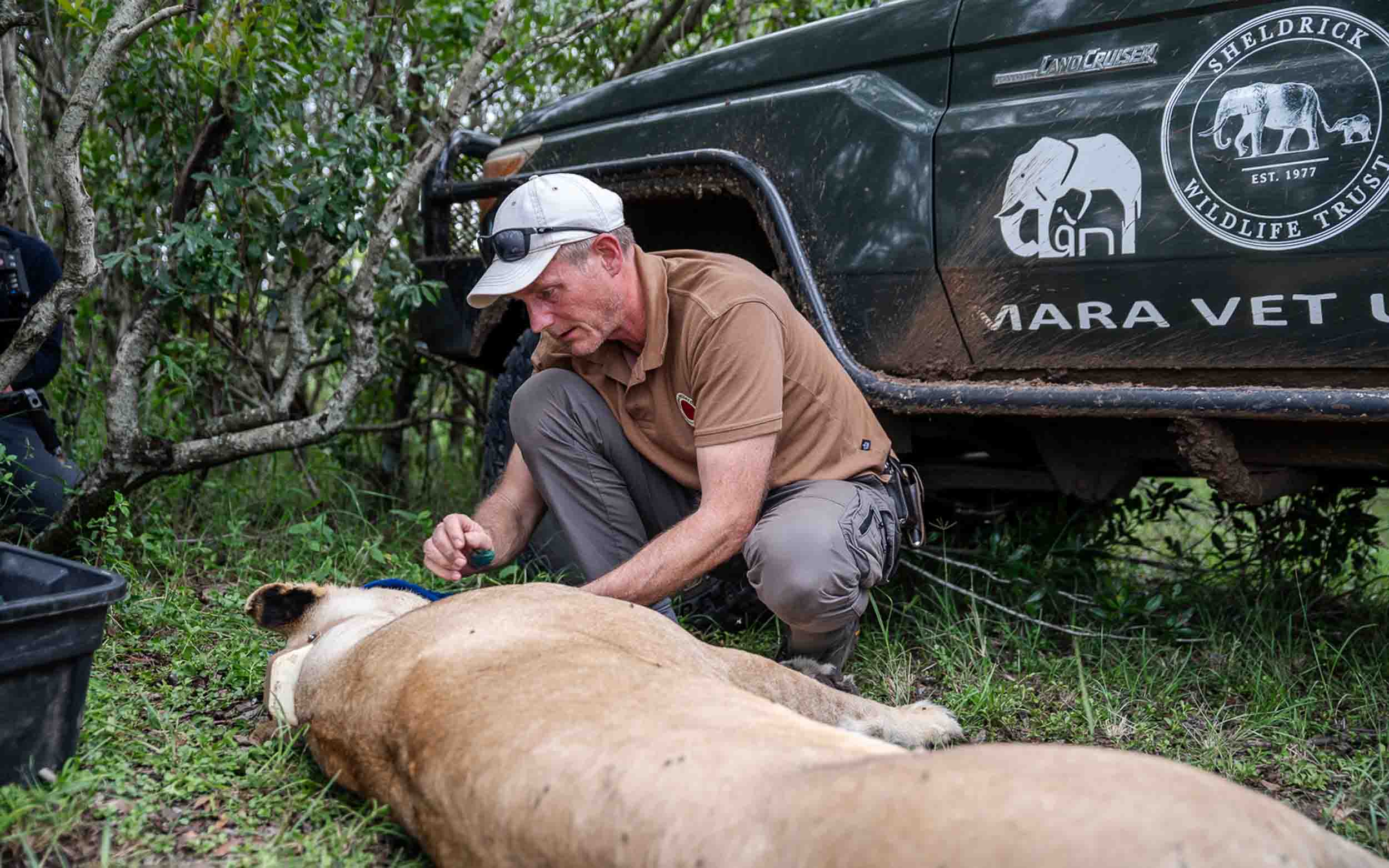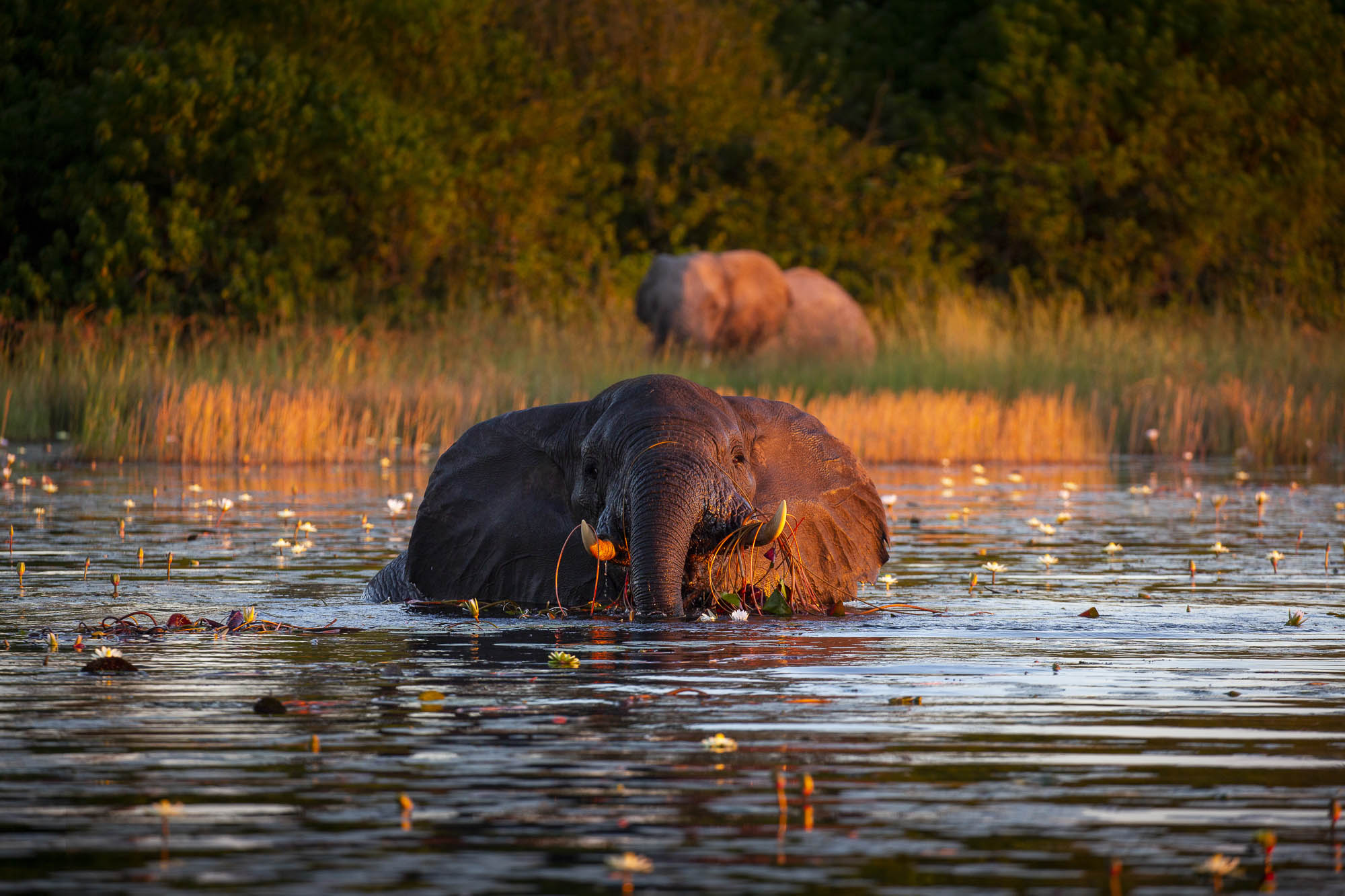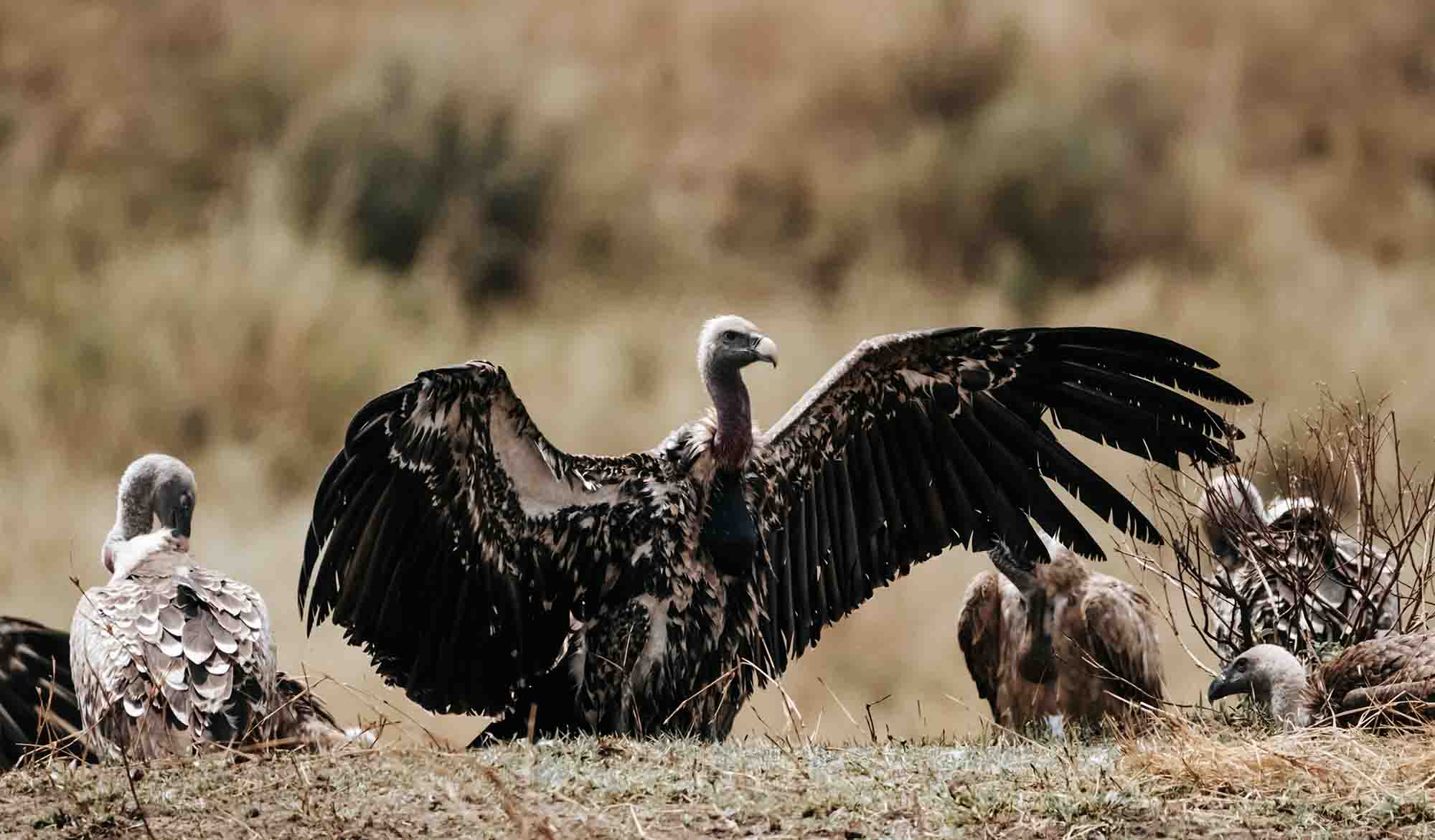9 Impact projects we’re proud of in 2024

At Wilderness, we are as determined as ever to have the greatest positive impact possible on our world’s wildlife, wild spaces and local communities. Our mission? To double the amount of land we help protect in the next decade. It’s an ongoing goal we’ll never stop striving to achieve. And it is why we do what we do every day.
It starts at our camps, but our impact extends far beyond those boundaries to ensure a lasting difference is made. These transformative projects are just a few of the ongoing initiatives we’ve been working on this year, defining Wilderness' commitment to conservation and community empowerment across our regions.
1) Lion collaring in the Mara
Governors’ Camp Collection, part of the Wilderness Family, is leading the charge for lion conservation in Kenya’s Masai Mara. Through the Mara Predator Conservation Programme (MPCP), our recent sponsorship of lion collaring efforts is helping researchers gather critical data on lion behaviour and movement. This initiative isn't just about wildlife; it's also about community involvement and a sustainable coexistence.
Our work with MPCP doesn't stop at collaring; the initiative also supports the Lion Ambassadors Programme, empowering local community members to bridge the gap between conservation organisations and communities.

"Through initiatives such as the Lion Ambassadors Programme, we are dedicated to all three pillars of our impact strategy: Educate, Empower, and Protect. This impact work is a crucial part of our focus in the region, and I commend the dedicated efforts of everyone involved in these ongoing efforts", says Vincent Shacks, Wilderness Group Impact Manager.
2) Empowering tomorrow's conservation leaders
Children in the Wilderness (CITW) has wrapped up another successful season of Eco-Camps for 2023/2024, empowering over 270 children with environmental knowledge and leadership skills. These camps, now in their twenty-second year, serve as the flagship programme for Wilderness' impact strategy, focusing on environmental education and leadership development among children from partner primary schools.
“When we apply our impact strategy’s Theory of Change as a tool for measuring the success of the holistic CITW programme, we are exceedingly proud of Wilderness’ positive influence in our communities”, says Vince. “In addition to our 2,378 Eco-Club members, and 567 children on the scholarship programme, we have dozens of food security eco-gardens in our Botswana, Namibian and Rwandan schools”.

These hosted camps aren't just about fun and games; they're about planting seeds of conservation in young hearts. Children partake in biodiversity activities, team-building, and tree-planting initiatives, nurturing a generation committed to protecting Africa's wilderness. Our Youth Environmental Stewardship (YES) Programme further empowers young conservationists to pursue careers that protect Africa's wildlife and habitats.
3) Holistic reforestation efforts
With the help of our guests, the 100,000-plus indigenous trees planted since 2017 at Wilderness Bisate near Volcanoes National Park, Rwanda, have transformed this previously degraded agricultural site into a thriving forest, with numerous wildlife species returning to the area.
“As of 4 March 2024, our cumulative planting figures for Bisate, Sabyinyo and Gishwati is 134,848 trees”, says Jason Glanville, Wilderness Rwanda Environmental Manager. This includes additional reforestation efforts aimed at restoring the area around our new Wilderness Bisate Reserve lodge due to open late 2024, further enhancing the overall ecological impact.
At our CITW Eco-Clubs, the curriculum teaches children about the importance of reforestation, and by working with conservation partners we help to reduce the need for expansive cropland, ensuring the protection of natural habitats. We're not just planting trees; we're nurturing ecosystems. Through these projects, Wilderness is renewing our ongoing commitment to our triple-pronged approach of 'empower, educate, protect' and applying it to reforestation.

4) Satellite collars aid elephant conservation
In Botswana's Okavango Delta, our ongoing partnership with Ecoexist is contributing to informed conservation decision-making. By donating satellite collars, we're helping to map elephant movements and mitigate human-wildlife conflict. The data we collect isn't just numbers; it's real insight that helps guide conservation efforts and protect these majestic animals.

“In regions where competition for water, food, and space is intense, Ecoexist consistently discovers and implements solutions beneficial for both species (humans and elephants)”, says Vince.
The project's aim is to identify, verify and monitor elephant movement corridors, which in turn assists with future land-use allocation processes. Now, one year in, recent results show that all five collars donated by Wilderness are operational, providing valuable insights into elephant movement across the southern part of the Delta.
Through Ecoexist and other stakeholders, we’re also proud to support a new initiative in Botswana: an Okavango beekeeping project. Wilderness recently donated 70 Langstroth hives to the Diyoveya Honey Project, which were distributed to local beekeepers. The purpose is threefold: the honey produced is used as both subsistence and for small-scale distribution; the bees from the hives support improved crop yield; and they act as a natural elephant-deterrent in villages. The name Diyoveya is a Hambukushu word meaning “abundance of elephants,” named for the large herds in this part of Botswana. Not only did Wilderness donate the hives, but we’ve committed to buying all honey available for sale to serve in certain Wilderness camps.
5) Protecting endangered vultures
The Wilderness Trust recently allocated donor funding to support the Endangered Wildlife Trust's Vultures for Africa Programme. Vital to a thriving ecosystem, vultures act as nature’s clean-up crew. But vultures face numerous threats, including poisoning incidents linked to poaching activities.
“These challenges not only endanger numerous vulture species, including Critically Endangered ones, but also have a cascading effect, placing other wildlife species at risk. Therefore, addressing vulture conservation is paramount to safeguarding the broader biodiversity and ecological balance”, says Vince.

Through our support of the Vultures for Africa Programme, we're raising awareness and helping to build capacity to respond effectively to vulture emergencies. Workshops across Africa also help engage stakeholders in vulture conservation, emphasising their critical role in maintaining ecosystem balance.
6) Zero-poaching milestone in Namibia
Thanks to community-based efforts supported by Wilderness and Save the Rhino Trust (SRT), Namibia's Kunene region achieved three consecutive years of zero rhino poaching in 2023, and hopes to celebrate a fourth this year.
“In order to support SRT’s primary objective to strengthen rhino monitoring and protection measures in Kunene, Wilderness came on board in January 2023 to fund the purchase of a new project vehicle to be stationed in the area, and to help purchase patrol rations, fuel and to pay for vehicle repairs and servicing. The vehicle has subsequently provided much-needed support to SRT’s foot-based patrol teams, and we are proud to see the continued support from our community partners to ensure zero poaching in the region”, notes Vince.

The Wilderness Trust's support for rhino monitoring and protection empowers local communities and contributes to the expansion of rhino ranges. Through ranger programmes and community engagement, we're not just helping to save rhinos; we're fostering a legacy of conservation.
7) Sustainable energy initiatives
18 fully solar-powered camps... 25 hybrid inverter powered camps... 4 million kWh or 1 246 022 litres of diesel fuel saved each year.
Wilderness is as committed as ever to minimising our environmental impact through renewable energy solutions. By harnessing solar and hydro technologies, we've significantly reduced reliance on fossil fuels, contributing to cleaner operations and demonstrating the viability of sustainable tourism practices. Every guest who travels with Wilderness contributes to this sustainability.

“Our goal to embrace sustainable energy will not stop here. Plans to retrofit additional camps with solar power, and to further invest in solar for all new camps and camp refurbishments, are on track. We are currently upgrading and renewing the solar array at our flagship camp in Botswana, Wilderness Mombo, to ensure the level of luxury and responsible operation is maintained”, says Warren Ozorio, Wilderness Group Environmental Management Systems Co-ordinator, and chief driver of Wilderness’ ongoing sustainable energy projects.
8) Cultivating community through agriculture
In Zimbabwe’s Matabeleland North, the Ngamo and Ziga Farm Co-operative initiative is sowing the seeds of change in sustainable farming and community empowerment. With a vision to create a self-sustaining agricultural ecosystem, this project harnesses the region's historical suitability for livestock farming while embracing innovative techniques like crop rotation and agroforestry.
But it's not just about what's grown; it's about how it's grown. Through engagement between Wilderness Zambezi, local stakeholders and community involvement, the project fosters a sense of ownership and pride among residents. From targeted breeding programmes to social impact initiatives, every aspect of the project is guided by a commitment to sustainability and inclusivity.
9) A war on waste
Wilderness champions waste reduction through its War on Waste campaign, focusing on eliminating single-use plastics and lowering carbon emissions. By implementing environmentally friendly practices in camp operations, we reinforce our commitment to responsible tourism and sustainable hospitality.
"This forms a crucial part of our Group Environmental Minimum Standards (GEMS) strategy, which has seen numerous successes across the Wilderness Group, most notably our reduction of bottled water usage by 96%”, notes Warren.

In place of plastic, guests are gifted refillable bottles, filled with water filtered through reverse osmosis (RO) filters.
How can you help?

Simply by joining us on our journey, you're already making a meaningful impact. Further to this however, the Wilderness Trust, an NGO established by Wilderness, accepts donations to enhance and expand our efforts. Operating independently, the Trust carefully allocates impact funds to advance our conservation objectives, ensuring we continue making strides toward our goals.
Learn more about these ongoing projects and contribute to vital conservation efforts


Let’s plan your next journey
Ready?
When we say we’re there every step of the way, we mean it, literally. From planning the perfect circuit, to private inter-camp transfers on Wilderness Air, and easing you through Customs. We’re with you on the ground, at your side, 24-7, from start to finish. Ready to take the road less travelled? Contact our Travel Designers to plan an unforgettable journey.